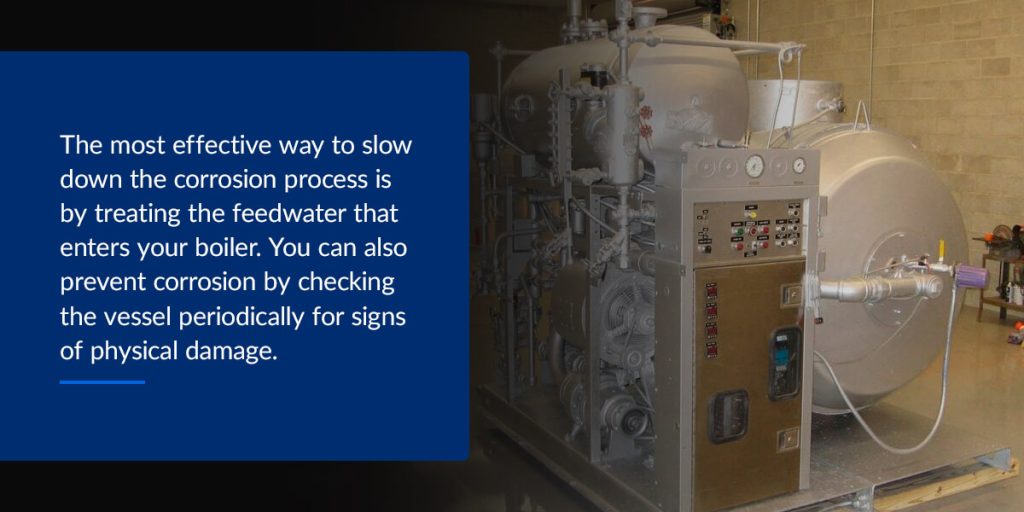

Boilers can be an essential part of many businesses, which is why it’s important to take care of them. Over time, the process of making steam can corrode the heating surface and lead to equipment failure. Fortunately, there are steps you can take to reduce corrosion and prevent the need for frequent boiler repairs. Below, the industrial equipment experts at the Smith Hughes Company of Cincinnati, Ohio, explain how you can protect your boiler room.
Corrosion is the destruction of metals due to chemicals and/or electrochemical reaction with their environment. General boiler corrosion affects the whole system while pitting is more localized corrosion, typically on small parts such as tubes. Boiler corrosion can reduce efficiency, increase costs and decrease the system’s life span. Damage can happen at any time but is more likely when you use your boiler minimally.
Boiler corrosion problems can happen for several reasons. Let’s take a look at the top three most common causes.
Steel becomes insoluble or soluble iron when oxygen is present. When it comes to the preboiler section and the tubes of your boiler, pitting will happen in the presence of oxygen. To prevent this pitting, you can scavenge the oxygen with catalyzed sodium sulfite or hydrazine.
The condensate return portion of your boiler system is often the portion affected by acid corrosion. If your boiler’s water is highly acidic with a low pH level, it can cause corrosion to begin. Typically, dissolved gases cause the water to become acidic and wear down the inside of your boiler. For example, carbon dioxide can cause water to become too acidic, which in turn causes pitting in the metal of your boiler.
If you have a high-pressure boiler, soluble nickel or magnesium salts can become acids that then corrode the inside of your boiler.
You can get rid of the buildup of gases in your boiler feedwater by using a deaerator tank. Deaerator tanks protect your boiler’s steam system from corrosive gases by decreasing the amount of carbon dioxide and dissolved oxygen in your boiler.
Solids present in your boiler’s water can also start corrosion. These solids could include iron, manganese, silica, calcium salts and magnesium salts. When deposited solids compromise your boiler, sodium salts can get trapped under the solids. Sodium salts do not cause buildup, but they can cause pitting and corrosion underneath the scale.

The most effective way to slow down the corrosion process is by treating the feedwater that enters your boiler. This type of damage is caused by oxidation, but there are solutions you can add to the water to promote the rapid absorption of oxygen before it has a chance to form corrosive cells. The right combination of additives will depend on a variety of factors that are unique to your equipment and water quality. Your boiler repair team will help you find the right treatment.
You can also prevent corrosion by checking the vessel periodically for signs of physical damage. Nicks and cracks that let in oxygen can also encourage corrosion.
As discussed before, you can also invest in a deaerator tank to reduce the risk of corrosion taking hold of your boiler.
Sealing openings in the tank will prevent oxygen from entering and contributing to water oxidation. If you notice signs of corrosion on the boiler, you may still be able to repair it, saving you the cost of a replacement. Powerful chemicals called corrosion inhibitors and alkalinity agents prevent the damage from getting worse, giving you the opportunity to repair the equipment. Implementing a water treatment plan and proper boiler maintenance routine minimizes the risk of oxidation in the future, helping you protect the system.
Corrosion can cause serious damage to your heating system that is difficult and expensive to fix. Fortunately, taking steps to address the cause and treat the early signs of a problem reduces your need for extensive boiler repairs.
The team at the Smith Hughes Company will diagnose the issue and recommend a cost-effective course of action. Learn more about the commercial services we provide, and call 1-888-956-SHCO to schedule a consultation. If you are looking to rent a boiler, we can help with your boiler rental needs, too.
At Smith Hughes, we sell boiler-related products, rent boilers and provide boiler room services. We have more than 75 years of boiler room experience, and our service technicians are on call 24/7 to help you with whatever you need, whenever you need it.
Whether you need a steam boiler rental, hot water boiler rental, hot oil heater rental, thermal fluid heaters or any other type of rental boiler, we have the resources you need available for whenever you need them. Smith Hughes services boilers in Ohio, Kentucky, Indiana, and beyond.